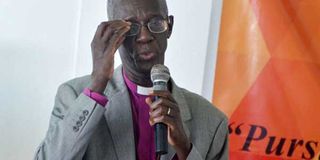‘Facts are sacred, comment is free’ the rule in reporting news

EACC Chairman Eliud Wabukala addressing participants of the 8th Annual Chaplaincy Conference Organised at Milele Beach Hotel in Mombasa on June 21, 2017. PHOTO | KEVIN ODIT | NATION MEDIA GROUP
What you need to know:
- In journalism, it is unethical and unprofessional to pass an opinion as a fact.
- It does not provide any tangible information to connect the archbishop to State House.
Archbishop Eliud Wabukala is “a sycophant.” This is the message in “Queries on state of independent bodies”, a story published on page 22 of the Sunday Nation of November 26.
The message is founded on the fact that the chairman of the Ethics and Anti-Corruption Commission (EACC) published a message on page 31 of the Daily Nation of November 23, congratulating Uhuru Kenyatta and William Ruto for their victory in the October 26 repeat presidential election.
The Sunday Nation story opens with this paragraph:
“It was a script taken straight out of ‘A Guide to Sycophancy 101’ or something similar. Thursday’s congratulatory message to President Uhuru Kenyatta and his deputy, William Ruto, for their victory in the October 26 election would have evaded curiosity, especially on social media, had it been from any other institution or individual.”
EACC
The second paragraph says the fact that the EACC chairman “found it prudent to pour effusive praise on the Executive gave communication to all those who have always questioned the independence and effectiveness of an institution meant to tackle Kenya’s most intractable problem”.
Nevertheless, it is part of our culture and ethos to send messages congratulating people who have made some remarkable achievement such as being elected to high office, winning a sports event, passing an exam, even getting married or giving birth to a baby.
Therefore, to call Archbishop Wabukala a sycophant because he sent a message is an opinion, not a fact. In the story the opinion is presented as a fact.
In journalism, it is unethical and unprofessional to pass an opinion as a fact.
It was Charles Scott, the famous British editor of the Manchester Guardian (now the Guardian), who gave journalism the much-repeated dictum that “Comment is free, but facts are sacred.”
But I would like to reverse the dictum to read, “Facts are sacred, comment is free” to emphasize the paramouncy of facts.
EDITORIAL POLICY
NMG editorial policy also states: “The Group’s news and information outlets will differentiate clearly between views and opinion on the one hand and news and reportage on the other.”
The story did not have a real byline; it was “By Nation Reporter.” Newspapers normally name authors of stories to encourage accountability, as well as to recognise them for their work.
But let me allow Caxton Muune, who complained about the story tell the rest of the story.
He says the motive of the story could be construed to mean Archbishop Wabukala is “a stooge and protégé of State House”. The story casts aspersions on his integrity. It discredits him and thus interferes with the independence and effectiveness of the EACC.
“A keen look at the report shows some streaks of bottled-up anger and bitterness the reporter has harboured towards the president-elect and the goodwill message was only a trigger,” says Prof Muune. “The reporter literally fired live bullets through the body of the publicity-shy man of God to hit the president-elect.”
AGENDA
The mission of the story was “character assassination.” It does not provide any tangible information to connect the archbishop to State House.
The reporter fails to maintain professionalism. The story is “retrogressive” as it tells old stories with regurgitated coverage of events and issues that took place way before Wabukala took over. It attempts to blame him for past failures.
“The reporter could have risen to the occasion and set the agenda forward and add value to the national effort to fight corruption and reinforce the resolve and independence of this institution instead of going out of way to discredit the chairman, which has only deepened the public mistrust and suspicion.
The net effect is a dramatic drop in the public confidence, which itself is a direct interference with the very independence the reporter was supposedly trying to protect.”
Prof Muune say the NMG should discourage “attack-dog journalism” because it is distasteful and negative.
“Time has now come for the NMG to defend the innocent with equal vigour and enthusiasm as the guilty to enable readers make independent conclusions.”
Send your complaints to [email protected]. Text or call 0721 989 264.





